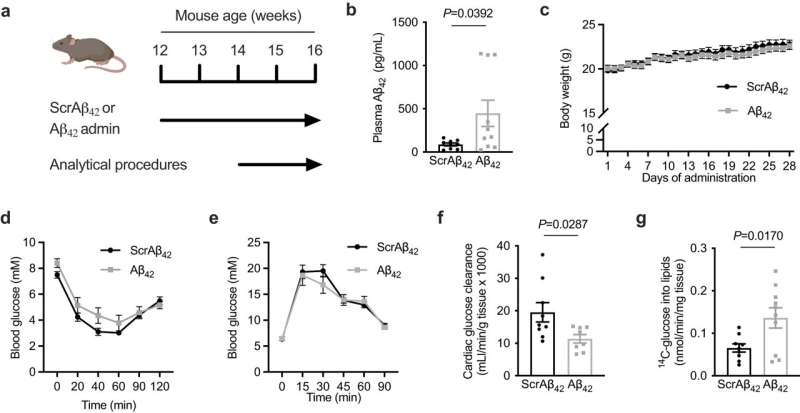This article has been reviewed according to Science X's editorial process and policies. Editors have highlighted the following attributes while ensuring the content's credibility:
fact-checked
peer-reviewed publication
trusted source
proofread
Research reveals new hope for obesity-induced heart disease

Obesity-induced heart disease, which affects up to 10% of the population in certain age ranges, is considered an untreatable condition and 75% of people don't survive more than five years beyond diagnosis.
But researchers from Deakin University have found a link between obesity and amyloid beta, a protein that has previously been implicated in the development of Alzheimer's Disease. Results of the study have been published in Nature Communications.
Professor Sean McGee, Professor of Medical Biology at Deakin's School of Medicine and the Institute for Mental and Physical Health and Clinical Translation (IMPACT), said a protein called amyloid beta accumulates in the brain, causing the deposition of brain plaques that contribute to the development of Alzheimer's Disease.
"As part of this world-first study, laboratory tests have revealed that amyloid beta is secreted from fat tissue into the bloodstream," McGee said.
"We looked at both lean mice and mice that were fed a high fat diet that results in obesity, and it was clear that obese mice had much higher levels of amyloid beta in their blood.
"This led us to ask whether amyloid beta was a causative factor in heart disease, so we treated normal lean mice with amyloid beta and then followed their heart metabolism and function, and found that it induced cardiac disease—just like obesity. We observed that amyloid beta accumulated in the mitochondria of the heart—the powerhouses of the cell that generate energy—and prevented energy generation in heart cells. Because the heart uses so much energy to pump blood, this is sufficient to cause heart disease.
"To our knowledge, this is the first time that amyloid beta has been implicated in a disease that is not Alzheimer's. To this point, it was thought that the negative effects of amyloid beta were restricted to the brain."
Results of this study are the first to describe the production and release of amyloid beta by fat tissue as a cause of heart disease. The discovery goes beyond explaining the causes, and has identified a possible approach to treat obesity-related heart failure.
"As amyloid beta is linked to Alzheimer's Disease there are numerous therapies and drugs that have been developed in recent years," McGee said.
"Many of these therapies were very effective in blocking the effects of amyloid beta and were safe in humans but most failed to effectively treat Alzheimer's Disease for various reasons. So we treated obese mice with one of these developmental Alzheimer's Disease drugs, and confirmed that it did indeed prevent the progression of cardiac disease.
"This tells us these amyloid beta-blocking drugs that have been developed for Alzheimer's Disease could be immediately repurposed for obesity-induced heart disease.
"Given these therapies already exist and have been safety tested in humans, it would be feasible to move directly to clinical trials in patients with heart disease. This will reduce the drug development process by around 10 years."
McGee is now seeking both grant funding and/or commercial support to advance this work.
"Obesity-induced heart disease has to now been considered an untreatable condition however this study shines a light on how it develops and provides a viable pathway for its treatment, and we are working to provide new hope to patients with this very challenging condition."
More information: Liam G. Hall et al, Amyloid beta 42 alters cardiac metabolism and impairs cardiac function in male mice with obesity, Nature Communications (2024). DOI: 10.1038/s41467-023-44520-4




















